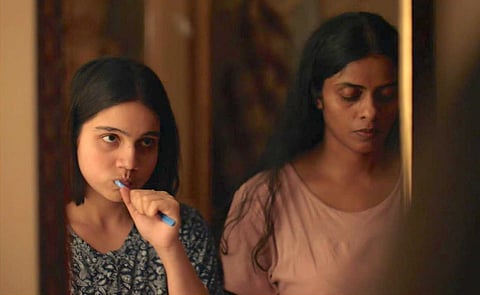

A couple of days after its world premiere at the Sundance Film Festival, Shuchi Talati’s debut feature, Girls Will Be Girls, is being hailed as a breakout film. Set in a boarding school in the hills of North India, it is about teenager Mira’s sexual awakening. But, more than that, it’s a complex exploration of Mira’s stormy relationship with her mother Anila who turns into an unforeseen rival in Mira’s pursuit of reckless romance.
Talati’s unfussy, unpretentious, and precise filmmaking, pushes the envelope when it comes to the representation of a parent-child relationship. Tackling issues often brushed under the carpet, the film’s audaciousness, however, is evened by emotional heft, warmth and empathy.
Excerpts:
First feature films are supposed to come from a personal space. How much of your protagonist Mira is in you?
All my films come from a personal space. By personal, I don’t mean that it happened to me, but the emotional landscape is very familiar. I didn’t go to a boarding school but my school was similarly strict. I feel like all the characters have a little bit of me. Mira probably has the most of me.
I’m about Mira’s mother Anila’s age now so I felt that I was writing in a way about my youth. But my current experiences made me see things from the mother’s point of view as well. She’s a young woman in her 30s. Why should she be relegated to a life which is asexual, like a supporting role in her daughter’s life? Why shouldn’t she have desires? Why shouldn’t she also want to rebel like her daughter?
There is so much nuance in the mother-daughter relationship. It’s a complex portrayal, of their rivalry, jealousy, reconciliation…
This idea comes from the fact that we’re still in a very imperfect, sexist world where we prize women for their youth and their beauty. As you start to lose them, you look at the younger women and think, “Why don’t I have it?” Why no longer me? I’ve seen that dynamic between mothers and daughters. It’s so much more common than you would think. I think it’s important to write feminist stories which are not like a message but explore the real complexity of experience.
It makes me go back to your short film Period Piece. I see a consistent engagement with themes of gender and women finding agency through sexuality…
I’m really interested in how power dynamics play out in sexuality. I’ve explored it in my previous work, and I don’t think I’ve exhausted it. Sexuality is almost like a conversation, it has all the beats of wanting something, getting something, rejecting, or accepting. Because it’s kind of taboo, I think its portrayal on screen is very simplistic sometimes. All these other dynamics of the relationship don’t find their way into the sex scenes that we see in cinema. For me, this is a rich territory, where you are not just physically but emotionally naked. It’s such a vulnerable space. I’m very interested in it.
In a regular romantic film, people fall in love, the story progresses, they have sex, and the story continues. So, sex is something they do but the relationship and story rarely evolves during this time. And that’s not my experience.
Kani Kusruti as the mother Anila is great as she usually is but Preeti Panigrahi is a revelation as Mira. So is Kesav as Sri. How did you spot them?
Mira is a character who is wise beyond her years. Preeti has the kind of strength, maturity and dignity that we needed.
At the auditions, there were all these very good actors but there wasn’t an aliveness. It felt like acting. For Preeti’s audition, we had the scene where Mira and Sri meet for the first time and talk. A lot of girls played it very coyly, batting their eyelids and a little bit shy. Preeti played it the way that I’d direct it, she has a certain strength and dignity and though she likes this boy, she’s not going to bat her eyelids and be coy and debase herself. There’s a dignity to her. When I saw Preeti, I really felt like she is Mira, she understood the spine of this character.
How did Richa Chadha come on board as a producer?
Richa and I are old college friends. Richa has always been more than an actor. She has also been a writer, and a thinker, and has always wanted to produce. She read my script and wanted to produce it. I wasn’t thinking of her as a producer, I just asked her to read it. She has been an amazing champion of the film. She understood it, protected it, and fought for me to have enough time to shoot.
But she didn’t think of doing Kani’s role?
No, neither of us ever saw her as that character. I think also for her first film, she just wanted to focus on producing and learning. She wants to produce stuff she believes in, not to have a role in it for herself.